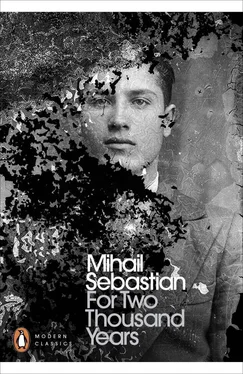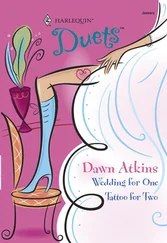‘What drives me mad about Professor Ghiţă is metaphysics. In a matter involving so many facts and practicalities — money, stones, oil, drainage work and water supply — he comes along with moral problems. I’m thinking in terms of practicalities, he in terms of metaphysics.’
‘Practicalities, practicalities!’ replies the professor contemptuously. ‘There’s only one thing it makes any practical sense to talk about: man.’
The argument has been going on for over five years, ever since Rice started work. Ghiţă Blidaru has pointedly refused to visit us in Uioara, and thus refused to set eyes on what he considers always to be a ‘deliberate crime’.
‘At last, he’s giving in,’ I said to myself, hastily, receiving the telegram. It was premature of me. Far from giving in, he has decided to criticize our work publicly.
His course this year will deal with the Romanian economy and its European deformations. The opening lecture will focus specifically on the two Uioaras, Old and New, as the starting point for the entire course. That’s why he’s here: to get some first-hand information.
He wouldn’t let me accompany him on his walk through the village. He assumes I’m in league with Vieru.
‘Stay at the oilfield and do your job. I’ll wander around on my own.’
In the evening he came to my workplace to get me. I was in boots, overalls and a short-sleeved collarless shirt. It seems I’ve turned terribly dark in the sun over the last few weeks.
‘You resemble a stonemason,’ he said to me. ‘It makes me happy to look at you.’
Like a stonemason … I don’t know about that. But I do feel free, at peace, ready to take things as they come, to await their unfolding with acceptance, to behold them without fear, to lose them without despair. I think of the big personal problems I used to have and I don’t understand them. I don’t understand them, and good riddance.
Life is easy. Life is terribly easy.
*
It rained two days in a row and the road from the cabin to Old Uioara is full of mud. I made a mighty fire in the stove and spent both evenings reading until past midnight. It smells of autumn — and we’re only in September. It brightened a little this morning and I thought the weather was picking up, but then it began pouring again, even more heavily.
At five, I received a visit that took me aback. Marjorie Dunton, in a raincoat, bareheaded, wet and trembling and noisy. (I hadn’t seen her in recent days. Except for once, last Wednesday I think, on the way to Prahova. She was with Dronţu, whom I just greeted in passing as he seemed terribly embarrassed.)
‘I’ve come to get you out of your lair.’
I found for her a dry blanket, slippers, a dressing gown and settled her by the fire so she could dry her hair, which, being so wet, was no longer blonde.
I made tea and had her drink it with lots of cognac.
So, we talked about this and that … I told her that in three or four days I would be leaving for Bucharest.
‘I know. You left around this time last year too.’
I like the direct way she speaks, without pauses, without pushiness, rather boyishly.
Later, Marin came in from the oilfield, not at all surprised at finding her with me. We walked her home together and, several times, where there was too much mud, I carried her over, swinging her and singing ‘Rock-a-bye Baby’.
She sang, triumphantly twirling the beret I’d given her to cover her head.
It’s a long way to Tipperary
It’s a long way to go …
The November issue of Der Querschnitt features a long essay on Mircea Vieru’s work, with photographs, scale models and reproductions. A special section on the Uioara project.
So, success. Definitive, incontrovertible success, from beyond the horizons of Bucharest. Who would have said, years ago, that it would come so soon?
When the professor took me the first time to Vieru’s house, I found him at the lowest point of his career. He was close to giving up the fight. If Ralph T. Rice hadn’t appeared from nowhere, Vieru would have been a broken man. I still don’t know today how he managed to put up with so much.
I couldn’t open a newspaper without finding a piece of news, an act of treachery, a farce. Everywhere, in the gossip columns, the society pages, in humorous magazines, in caricatures, the ‘affair of the day’, everywhere Mircea Vieru, only Mircea Vieru, every day Mircea Vieru. Every gaffe was attributed to him, every piece of nonsense was spoken by him, every joke was on him. In the summer, in the Cărăbuş review theatre, Tănase, with a trowel in one hand and a brick in the other, recited a couplet explaining the whole ‘affair’. Everybody laughed terribly, and I remember I found it amusing myself at the time. I later learned that Vieru had made a point of not leaving Bucharest that summer, so that it couldn’t be said of him that he was trying not to be seen. What cruel moments he must have lived through, he who is so proud, so sensitive to the smallest detail, such a child when it comes to slights and revenge.
It was mostly out of curiosity that I accepted when the professor offered to recommend me to Vieru for a place in his workshop. A second-year student, I didn’t have high hopes of any great personal success with an architectural firm; I lacked even a basic grasp of what was going on with which to orient myself. But the man interested me; he had initiated so many attacks, got involved in so many struggles, and aroused such opposition. Everyone was against him: the press, his peers, the school, officialdom, ministries, all Bucharest, all Romania, the whole world.
‘You’re going to meet the most detested person on the face of the planet,’ said the professor, climbing the stairs ahead of me, to the office.
The most detested person on the face of the planet! Blond, blue-green eyes, a bright, open smile, a modest bearing, with unexpected flashes of pride, nervous hands, a deep, even voice, never raised, though often giving an impression of vehemence, by emphasis, phrasing, pauses … The abominable Mircea Vieru looked something between a schoolboy and an amateur botanist. Only later, getting to know him, did I realize that his forcefulness, of which they make so much, is not imaginary. On the contrary, it is very sharp and penetrating. It is an intellectual force, an objective force in the world of values and ideas, which has nothing to do with his personal goodness and limitless generosity. Vieru is forceful as only the good can be, disinterestedly, passionately, freely. I now understand well that poison vortex in 1923, which he had to rise above at all costs.
When, immediately following the war, Mircea Vieru came up with some rather insolent notions in his works on architecture and town planning, he seemed more amusing than anything. ‘That damned Vieru,’ would think his fellow architects, with a mixture of vague admiration and disbelief.
‘ Architecture isn’t a private matter between a man with money and a man with a diploma. Architecture is a matter of communal life. Any liberties can be taken, but the liberty of bad taste may not. A badly conceived house is a disturbance of the peace .’
‘That damned Vieru!’
But when Mircea Vieru went from general ideas and opinions to the nitty-gritty of individual cases, naming names and involving people and projects, things took another turn. Toes were stepped on — and that’s a serious matter.
For some three years, this man did nothing but denounce. A building over a certain size couldn’t be built without him putting it on trial publicly and in writing. In detail, with photographs, figures, names, following the entire process step by step, checking, challenging, attacking. He no longer took any interest in his own projects. What excited him now about architecture were its fashions, errors, clichés and pointless attempts at innovation. He had stopped being an architect and had become a pamphleteer. How many competitions were disrupted by one of his inopportune interventions, how many contract-winners were endangered by him, how many artistic collaborations fell apart as a result of his lack of tact! They still laughed, here and there, at his audacity, at his extraordinary polemical verve, but it was nervous laughter. Because no one knew what was coming next from this blond, edgy, intolerant little man who spent the little money he had printing magazines of art and criticism, which he wrote, corrected and administered alone, exhausted by work but relentlessly passionate.
Читать дальше












